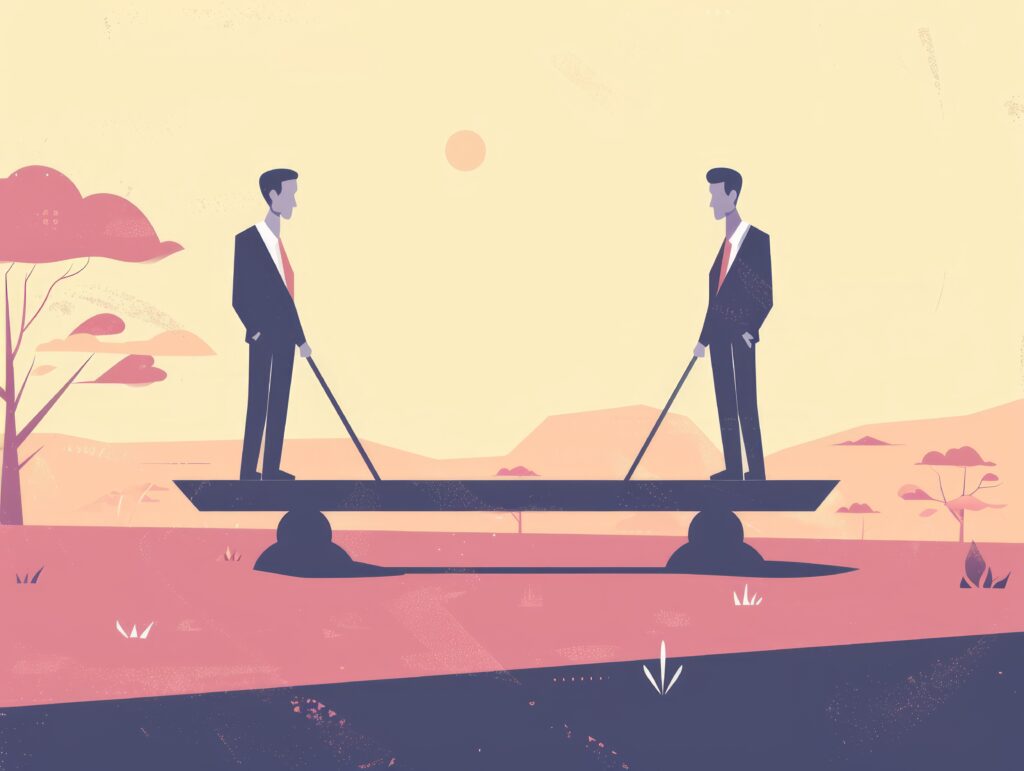Table of Contents
In a world that often feels like a battlefield of competing interests, there exists a powerful alternative framework that’s reshaping how we think about success, cooperation, and progress. This framework is non-zero-sum game theory, and understanding it might fundamentally change how you approach relationships, business, and life itself.
The Origins: Breaking Free from the Win-Lose Mentality
To understand non-zero-sum thinking, we first need to grasp its opposite. Zero-sum games are situations where the total gains and losses always equal zero. Think of poker: the money you win is exactly the money someone else loses. If you gain five dollars, someone else must lose five dollars. The total remains constant, merely redistributed among players.
This zero-sum mindset permeates our culture more than we realize. Sports competitions, political elections, and even workplace promotions often appear as zero-sum contests. There’s one trophy, one presidency, one promotion, and only one winner. This framework is so deeply embedded in our thinking that many people unconsciously apply it to situations where it doesn’t actually apply.
Non-zero-sum theory, popularized by science writer Robert Wright and grounded in game theory developed by mathematicians like John von Neumann, presents a radically different view. In non-zero-sum situations, outcomes aren’t fixed. Both parties can win, both can lose, or the results can be mixed. The total gains and losses don’t need to equal zero. The pie itself can grow or shrink.
The Mathematics of Cooperation
At its core, non-zero-sum theory reveals something profound about cooperation and competition. When two parties work together effectively, they can create value that didn’t exist before. This isn’t wishful thinking or naive optimism; it’s mathematical reality.
Consider a simple example: two neighbors each have fruit trees. One has apples, the other has oranges. If they view this as zero-sum, they might compete over land, water, or prestige about who has the better orchard. But in a non-zero-sum framework, they simply trade. Both end up with apples and oranges. Value has been created through exchange, not extracted through competition.
This principle scales dramatically. International trade operates on this logic. When countries specialize in what they do best and trade with each other, total global wealth increases. Innovation ecosystems work this way too. When companies share certain standards and protocols, everyone benefits from the enlarged market and reduced friction, even while competing in other areas.
The mathematics becomes even more interesting when we consider repeated interactions. Game theorists have demonstrated that when people expect to interact multiple times, cooperation becomes the rational strategy. The famous “Prisoner’s Dilemma” shows that while betrayal might offer short-term gains, sustained cooperation produces better outcomes over time for both parties.
Real-World Applications: Where Win-Win Actually Happens
In Business and Economics
The entire concept of business transactions rests on non-zero-sum logic. When you buy a sandwich, you value the sandwich more than the money you’re paying, and the shop values the money more than the sandwich. Both parties benefit, or the transaction wouldn’t occur. This simple insight explains why free markets can generate prosperity: they’re machines for creating mutually beneficial exchanges.
Successful businesses increasingly recognize that supplier relationships, employee relations, and even customer interactions work best as non-zero-sum partnerships. Companies that squeeze suppliers relentlessly might win in the short term, but they often lose innovation, quality, and reliability over time. Those that treat suppliers as partners often unlock insights, improvements, and loyalty that create value for everyone.
In Personal Relationships
Healthy relationships exemplify non-zero-sum dynamics. In a good friendship or partnership, both people grow, learn, and thrive together. Your success doesn’t diminish your partner’s prospects; it often enhances them. Their happiness doesn’t come at the expense of yours; it amplifies it.
Contrast this with toxic relationships, which often become zero-sum or negative-sum. Energy gets consumed in conflicts, scorekeeping, and competition. Both parties end up worse off than they would be apart. Recognizing this pattern can be liberating: it reveals that staying in such relationships isn’t noble self-sacrifice but participation in mutual destruction.
In Knowledge and Innovation
Perhaps nowhere is the non-zero-sum nature of human activity clearer than in knowledge creation. When you teach someone what you know, you don’t lose that knowledge. Instead, you’ve doubled its presence in the world. That person might build on your ideas, creating insights that benefit you both.
This principle underlies the open-source software movement, academic research, and creative commons licensing. By sharing rather than hoarding, communities of creators generate exponentially more value than any could produce in isolation. Your contribution to a common pool of knowledge makes everyone richer, including you.
The Dark Side: When Win-Win Becomes Destructive
Non-zero-sum theory isn’t universally positive.
Some non-zero-sum scenarios are negative-sum, where everyone loses. War often fits this category. Both sides expend enormous resources, human lives, and opportunities. Even the “winner” usually ends up worse off than if the conflict had been avoided entirely. Environmental degradation represents another negative-sum game, where short-term gains for some create long-term losses for everyone.
Additionally, coalitions can form non-zero-sum partnerships that benefit their members while harming outsiders. Cartels, monopolies, and corrupt political alliances work this way. The members cooperate with each other in a non-zero-sum fashion, but they do so to extract value from others in a predatory zero-sum or negative-sum dynamic.
This reveals an important nuance: non-zero-sum doesn’t automatically mean ethical or beneficial. It simply describes a mathematical relationship between outcomes.
Recognizing Zero-Sum Thinking in Your Life
Before you can apply non-zero-sum thinking, you need to identify where zero-sum assumptions are limiting you. These assumptions shape decisions without your awareness.
Do you hesitate to share professional insights, fearing others will get ahead? That’s zero-sum thinking. In reality, being generous with knowledge often establishes you as an expert and builds networks that create opportunities.
Do you view your partner’s achievements with subtle resentment or competition? That’s zero-sum creeping into relationships where it doesn’t belong. In a healthy partnership, each person’s success provides resources, confidence, and opportunities that benefit both.
Do you approach negotiations assuming any gain for the other side is your loss? This mindset prevents creative solutions that expand value for everyone. The best negotiators search for trades where each party gives up something they value less for something they value more.
Zero-sum thinking often stems from scarcity mindset—the belief that there’s never enough to go around. This belief can become self-fulfilling. When everyone hoards and competes, cooperation breaks down, and actual scarcity results.
Practical Strategies: Creating Win-Win Outcomes
Seek Complementarity, Not Similarity
The greatest win-win opportunities often arise from differences, not similarities. Look for people, organizations, or situations where your strengths complement others’ strengths. If you’re creative but disorganized, partnering with someone systematic can benefit both. If your company excels at product development but struggles with distribution, collaborating with a company with the opposite profile creates mutual value.
Extend Your Time Horizon
Many situations appear zero-sum in the short term but non-zero-sum over longer periods. Companies that prioritize customer satisfaction over immediate profit, or professionals who help others generously, often find this investment pays compound returns.
Ask Better Questions
Instead of “How do I win?”, ask “How can we both win?” Instead of “How do I get more of the existing pie?”, ask “How can we make the pie bigger?” In negotiations, discover what the other party truly values. Often, you can offer something that costs you little but benefits them greatly, and vice versa. These trades create value from thin air, transforming potential conflict into mutual gain.
The Evolutionary Perspective: Why Cooperation Wins
Robert Wright’s exploration of non-zero-sum dynamics in his book “Nonzero” reveals a fascinating pattern: human history shows increasing complexity built on expanding non-zero-sum interactions. From hunter-gatherer bands to agricultural villages to global economies, each step involved more complex cooperation creating greater total value.
This isn’t accidental. Evolution favors strategies that work. In environments where repeated interactions occur, cooperative strategies outcompete purely selfish ones. The groups that learned to create win-win outcomes survived and thrived. Those trapped in zero-sum thinking stagnated or collapsed.
This suggests something optimistic: we’re literally built for cooperation when conditions allow it. Our instinct toward reciprocity, fairness, and partnership isn’t naive idealism. It’s sophisticated social technology honed over millennia. As our world becomes more interconnected, the scope for non-zero-sum outcomes expands dramatically. Climate change, global health, and technological development present challenges that no individual or nation can solve alone. They require cooperation at unprecedented scales.
Changing Your Lens Changes Your World
Non-zero-sum theory offers more than an interesting intellectual framework. It provides a practical tool for creating better outcomes in virtually any situation involving other people. By shifting from “How do I win?” to “How can we all win?”, you unlock possibilities that competitive thinking obscures.
This doesn’t mean abandoning your interests or becoming a pushover. It means recognizing that in many situations, the best way to serve your interests is by creating value for others too. It means understanding that cooperation and competition aren’t opposites but can be combined strategically.
The win-win equation isn’t complicated mathematics. It’s a simple recognition: in a world of potential abundance, your success and others’ success can reinforce each other. The challenge isn’t scarcity—it’s imagination. Once you see the world through a non-zero-sum lens, you’ll discover opportunities for mutual benefit everywhere.
The question isn’t whether non-zero-sum dynamics exist. They surround us constantly. The question is whether you’ll recognize them, create them, and use them to build a better outcome for everyone involved, including yourself.


